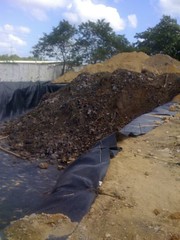The proposed revisions to the state’s controversial (and according to the U.S. Environmental Protection Agency (EPA) – illegal) flexible air permitting programs submitted in June in an effort to reach a compromise with the EPA, are scheduled for a formal vote at tomorrow’s hearing of the Texas Commission on Environmental Quality (TCEQ).
Under the proposed revisions, facilities with flexible permits would be subject to stricter record-keeping. In addition, tighter caps would be placed on some emission points within affected facilities.
The EPA has ruled that Texas’ flexible permits do not comply with the U.S. Clean Air Act, and that ruling has touch off a political and legal war between the state and the federal agency. The state’s legal challenge to the EPA is pending in the 5th U.S. Circuit Court of Appeals.
The program, which has been in place since 1994 without the EPA’s formally approval, even with the proposed revisions to address the EPA’s concerns, still has provisions that the federal agency, during the public comment period, deemed “too broad.”
TENASKA Air Permit
Also on TCEQ’s agenda tomorrow is the air quality application for Tenaska Energy of Omaha’s 600-megawatt plant, Trailblazer Energy Center between Sweetwater and Abilene in Nolan County.
We expect the permit will be approved by the Commissioner, since it is a rubberstamp commission, however, the administrative law judges from the State Office of Administrative Hearings, which heard several days of testimony about Tenaska’s plans, recommended in October that TCEQ should require the plant to meet stricter limits on a range of harmful emissions that the facility would produce.
Under the ALJs’ recommendations, Trailblazer would have to demonstrate that the plant would have lower emissions for nitrogen oxide, or NOX, as measured by 24-hour and 30-day averages and lower volatile organic compound, or VOC, emissions as measured by 30-day and 12-month averages than currently projected.
The judges also asked that a special condition be imposed that would require VOC testing both when the carbon-capturing technology is being used at the plant and when the technology is being bypassed.
Goliad Uranium Mining
Also on this action packed agenda is Uranium Energy Corporation’s (UEC) proposed permit to drill for uranium in Goliad county.
An administrative law judge from the State Office of Administrative Hearings recommended in September that UEC be required to do additional testing on the fault area covered by the permit, which is about 13 miles north of the city of Goliad and nearly a mile east of the intersection of State Highway 183 and Farm-to-Market Road 1961. If granted, the permit would allow uranium drilling in a 423.8-acre area, according to the docket.
The TCEQ hearing starts at 9:30 a.m. at the agency’s headquarters 12100 Park 35 Circle (near Interstate 35 and Yager Lane in North Austin). If you want to watch the streaming video of this hearing, click here. Video is also archived on this site, generally within 24 hours after a hearing and you can get to it from the same link above if you can’t watch it tomorrow while it is happening.
###
By promoting cleaner energy, cleaner government, and cleaner air for all Texans, we hope to provide for a healthy place to live and prosper. We are Public Citizen Texas.
Read Full Post »


 The Las Brisas coal (pet coke) plant proposed for Corpus Christi has had its air permit recommended for denial by the State Office of Administrative Hearings (SOAH) for the second time. The SOAH judges presiding over the case have stated in their “proposal for decision” that:
The Las Brisas coal (pet coke) plant proposed for Corpus Christi has had its air permit recommended for denial by the State Office of Administrative Hearings (SOAH) for the second time. The SOAH judges presiding over the case have stated in their “proposal for decision” that:






